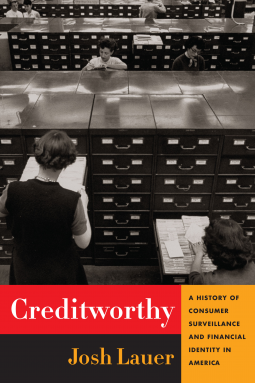Please wait... This may take a moment.
Creditworthy
A History of Consumer Surveillance and Financial Identity in America
This title was previously available on NetGalley and is now archived.
Pub Date
Jul 25 2017
| Archive Date
Aug 29 2017
Description
The first consumer credit bureaus appeared in the 1870s and quickly amassed huge archives of deeply personal information. Today, the three leading credit bureaus are among the most powerful institutions in modern life—yet we know almost nothing about them. Experian, Equifax, and TransUnion are multi-billion-dollar corporations that track our movements, spending behavior, and financial status. This data is used to predict our riskiness as borrowers and to judge our trustworthiness and value in a broad array of contexts, from insurance and marketing to employment and housing.
In Creditworthy, the first comprehensive history of this crucial American institution, Josh Lauer explores the evolution of credit reporting from its nineteenth-century origins to the rise of the modern consumer data industry. By revealing the sophistication of early credit reporting networks, Creditworthy highlights the leading role that commercial surveillance has played—ahead of state surveillance systems—in monitoring the economic lives of Americans. Lauer charts how credit reporting grew from an industry that relied on personal knowledge of consumers to one that employs sophisticated algorithms to determine a person's trustworthiness. Ultimately, Lauer argues that by converting individual reputations into brief written reports—and, later, credit ratings and credit scores—credit bureaus did something more profound: they invented the modern concept of financial identity. Creditworthy reminds us that creditworthiness is never just about economic "facts." It is fundamentally concerned with—and determines—our social standing as an honest, reliable, profit-generating person.
The first consumer credit bureaus appeared in the 1870s and quickly amassed huge archives of deeply personal information. Today, the three leading credit bureaus are among the most powerful...
Description
The first consumer credit bureaus appeared in the 1870s and quickly amassed huge archives of deeply personal information. Today, the three leading credit bureaus are among the most powerful institutions in modern life—yet we know almost nothing about them. Experian, Equifax, and TransUnion are multi-billion-dollar corporations that track our movements, spending behavior, and financial status. This data is used to predict our riskiness as borrowers and to judge our trustworthiness and value in a broad array of contexts, from insurance and marketing to employment and housing.
In Creditworthy, the first comprehensive history of this crucial American institution, Josh Lauer explores the evolution of credit reporting from its nineteenth-century origins to the rise of the modern consumer data industry. By revealing the sophistication of early credit reporting networks, Creditworthy highlights the leading role that commercial surveillance has played—ahead of state surveillance systems—in monitoring the economic lives of Americans. Lauer charts how credit reporting grew from an industry that relied on personal knowledge of consumers to one that employs sophisticated algorithms to determine a person's trustworthiness. Ultimately, Lauer argues that by converting individual reputations into brief written reports—and, later, credit ratings and credit scores—credit bureaus did something more profound: they invented the modern concept of financial identity. Creditworthy reminds us that creditworthiness is never just about economic "facts." It is fundamentally concerned with—and determines—our social standing as an honest, reliable, profit-generating person.
A Note From the Publisher
Part of the Columbia Studies in the History of U.S. Capitalism
Devin Fergus, Louis Hyman, Bethany Moreton, and Julia Ott
Part of the Columbia Studies in the History of U.S. Capitalism
Devin Fergus, Louis Hyman, Bethany Moreton, and Julia Ott
Advance Praise
"Clearly written, well researched, and wide ranging, Creditworthy
provides a fresh account of the evolution of credit agencies in the United
States. By combining insights from media theory, business history, and cultural
studies, Lauer probes the sometimes unsettling role of corporate surveillance
in the making of financial identity."
—Richard R. John, Columbia University
"Clearly written, well researched, and wide ranging, Creditworthy provides a fresh account of the evolution of credit agencies in the United States. By combining insights from media theory...
Advance Praise
"Clearly written, well researched, and wide ranging, Creditworthy
provides a fresh account of the evolution of credit agencies in the United
States. By combining insights from media theory, business history, and cultural
studies, Lauer probes the sometimes unsettling role of corporate surveillance
in the making of financial identity."
—Richard R. John, Columbia University
Available Editions
| EDITION |
Other Format |
| ISBN |
9780231168083 |
| PRICE |
$140.00 (USD)
|
Additional Information
Available Editions
| EDITION |
Other Format |
| ISBN |
9780231168083 |
| PRICE |
$140.00 (USD)
|
Average rating from 10 members
Readers who liked this book also liked:
Out Law
Jim Butcher
Mystery & Thrillers, Sci Fi & Fantasy
Detour
Jeff Rake; Rob Hart
General Fiction (Adult), Mystery & Thrillers, Sci Fi & Fantasy
Manifest Destiny
Pelumi Olatinpo
Essays & Collections, Multicultural Interest, Politics & Current Affairs
Python's Kiss
Louise Erdrich
General Fiction (Adult), Novellas & Short Stories, Women's Fiction
Korean Messiah
Jonathan Cheng
Biographies & Memoirs, History, Politics & Current Affairs
The Traitor
Kōbō Abe
General Fiction (Adult), Historical Fiction, Literary Fiction
American Han
Lisa Lee
General Fiction (Adult), Multicultural Interest



















